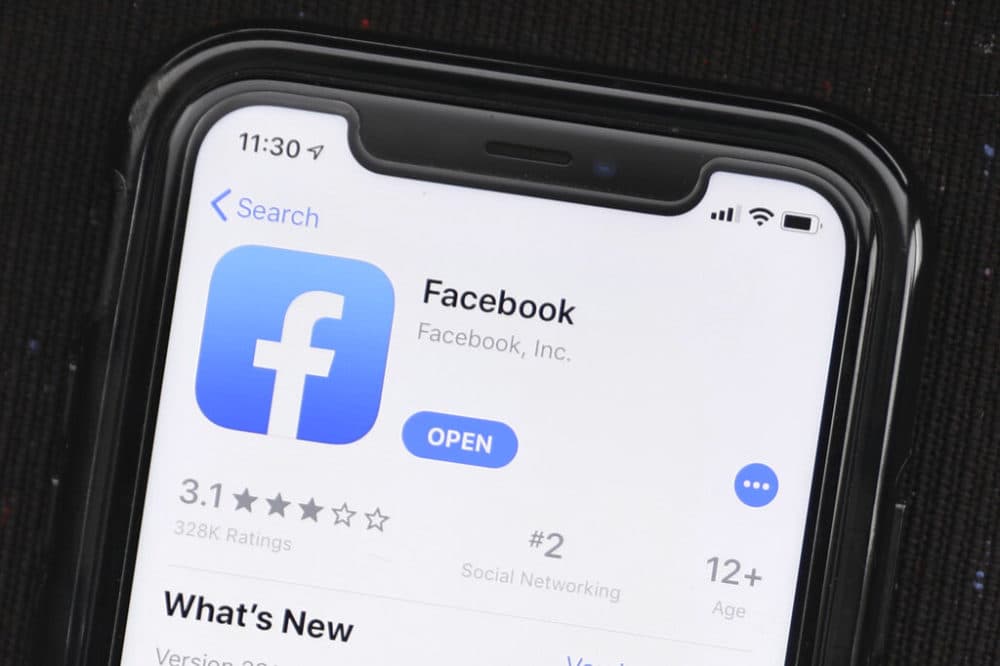Advertisement
Why Facebook Turned Off The News In Australia
Resume
Facebook hits delete on the news in Australia in response to regulation. Should the platform hold this level of power? And what could the standoff mean for journalism on social media worldwide?
Guests
Elizabeth Renieris, founding director of the Notre Dame-IBM Technology Ethics Lab. Human rights fellow at Harvard’s Carr Center. Fellow at Stanford’s Digital Civil Society Lab. (@hackylawyER)
Jeff Jarvis, director of the Tow-Knight Center for Entrepreneurial Journalism at the City University of New York. Author of "What Would Google Do?" (@jeffjarvis)
Elizabeth Dwoskin, Silicon Valley correspondent at the Washington Post. (@lizzadwoskin)
Also Featured
Mary-Jane Fenech, engagement producer at Australian Broadcasting Corporation (ABC). (@mary_janef)
Stephen Scheeler, Former Facebook CEO for Australia and New Zealand.
Interview Highlights
On the deal Facebook has struck with the Australian government
Elizabeth Dwoskin: “At this moment, it's a little bit vague, but basically the Australian government has agreed to essentially amend this proposed law. And the amendments would basically take out what Facebook thought was the worst part of the deal, which was this arbitration clause, which essentially said that, you know, the social platforms and these media conglomerates and companies should negotiate their rates for how much the tech platforms are going to pay them for their content.
“But if it doesn't work out, they have to go to this arbitration and the government will set the rate. And Facebook said, No, nobody's messing in my business like that. And that's what caused a standoff. That's what caused them to pull the plug on news for the whole country. And now they say that that clause is still there, but there's a lot more flexibility so that it's only a last resort.”
On what happened when many Facebook feeds went blank
Elizabeth Dwoskin: “It was blank for thousands of pages, and not just the news pages. You may have heard that Facebook took a very liberal interpretation of news. A lot of people think that was just kind of sticking it to the Australian government. Which is that they just deleted any page, blocked any page that had to do with what they thought was newsworthy.
"So we're talking about — this is the week of Australia's rollout for vaccines, and they made all the public health pages on Facebook blank. They made fire rescue pages -- It's also Australia's fire season. And you think about how much Facebook is often used for people saying, Hey, I'm here during a disaster, or I need help. Those pages went blank.
"Pages for survivors of sexual assault and groups like that went blank. Groups targeting misinformation like nonprofits went blank. So there were thousands of charities that were also swept up. Later Facebook said quote-unquote that was a mistake. But if you read between the lines, it's not very hard to see that they were saying the law is written so broadly that we're just going to do everything and kind of show our might and ... flex.”
On what’s at stake in Facebook's deletion of news in Australia
Elizabeth Renieris: “What's been really interesting in all this is how often Facebook has repeated the mantra that the law in Australia fundamentally misunderstands the relationship between platforms and news publishers. But I think what's really at stake here is that Facebook and particularly Mark Zuckerberg fundamentally misunderstand the relationship between large corporations and sovereign nation states like Australia.
"To me, this story is really about a private company negotiating against a democratically elected government. And about the power of a single company to, in one fell swoop, deny an entire nation access to information, particularly, as noted before, in the middle of a pandemic. And it's about how to hold a large monopolistic company like Facebook accountable to democratic processes.”
What business does a government have at all, being in the middle of transactions or business relationships between two essentially private companies?
Elizabeth Renieris: "I think this is ... an example of a law with a lot of problems or a draft law with a lot of problems and also a company that's taken some concerning action. So I think there are certainly a lot of concerns with the proposed bargaining code. I don't think it's the correct vector for addressing the type of monopolistic power and the concerns around reliance upon Facebook's infrastructure.
"I think there are better regulatory interventions that democratic governments should entertain. At the same time, it doesn't make Facebook's response or actions justified. And I do think it's a wake up call for governments around the world about just how much power they can exert over what we see and what we experience.”
How would you characterize what the role of News Corp. or Rupert Murdoch is in this Facebook story?
Jeff Jarvis: “I've heard a lot of talk on the show so far about large, monopolistic, powerful corporations with individuals at the helm that have an effect on sovereign nations. I'll agree with the characterization, but argue that the focus so far has been wrong. The focus of all that description is News Corp. and Rupert Murdoch. He used his political capital and cashed it in to get this protectionist legislation, this shakedown, this bribery ... that has a profound impact on the structure of the web.
"Sir Tim Berners-Lee testified before Australian legislators, saying that this breaks the web. And in the end, Crikey, a site in Australia this morning said that 90% of the money from the tech companies is going to go to the big companies, is going to go to Murdoch. Murdoch wins here in every case. Keep in mind that Murdoch himself wanted to be Mark Zuckerberg. He had MySpace. He failed with the Internet again and again and again and again. And so now he resorts to, as I say, cashing in his political capital to try to get some money out of the platforms, but more importantly, to hamper those platforms.
"Let's be honest here. First this has been called on and off a link tax. It's not a one for one link tax, but the legislation is written such that those who link must pay. Ergo, it's a tax on links. Second, what Facebook and Google both did is they started, in Google's case, it's a showcase for news. In Facebook's, it's news tab. And these are frankly nothing more than efforts to give baksheesh, bribery money, payoff money, shakedown money to the publishers so they'll stop engaging in the conflict of interest of lobbying the people they should be covering in government to do this.
"And the truth is that Zuckerberg dealt with this with Thomson from News Corp. about a year ago. He admitted that, frankly, people aren't going to read the news tab. Google, I don't think thinks anyone's going to read the showcase. But this is a way that they could give money to the platforms to try to get them to lay off with the politicians who are in Murdoch's pocket.”
On the Zuckerberg-Murdoch comparison
Elizabeth Renieris: “I do want to respond quickly to comparing Mark Zuckerberg to Murdoch. So with Murdoch, we have consolidation of power in one industry, in a small handful of jurisdictions. With Mark Zuckerberg, we have consolidation of power across an infinite array of industries with really no regulation because we can't figure out where to put social media and across the world. So I think that once again, the scale of the problem is very different.
"And also responding to the fact that in recent years we've seen the elevation of Black Lives Matter and other voices. And to the assertion that that's why these platforms are responsible for sort of elevating those voices. I mean, in my view, these voices would have been heard a long time ago if we didn't have such concentrated epistemic control. And if we didn't have the proliferation of things like hate speech and harassment, that were silencing these voices. So I don't know that that's entirely fair to say."
On regulatory intervention with social media platforms
Elizabeth Renieris: "So I think the regulatory interventions have to address ... the root causes of what we see, the symptoms that we're seeing. So misinformation, disinformation, questions around content, hate speech. These things are really symptoms of underlying problems that have to do with things like fundamental corporate governance challenges.
"... For example, the concentration of power within Facebook's board and the duality of Mark as CEO and chairman is a really important one. I think it has to do certainly with antitrust and competition concerns and the level of market dominance. That we see a lot of interesting laws looking at things like gatekeepers. And similarly, in the Australian proposal, there's a concern about the sort of dominance of particular companies or platforms with such gatekeeping powers.
"It's going to have to do with consumer protection. It's absolutely going to have to do with data protection and privacy. We still don't have comprehensive federal privacy legislation in the United States. We have seen some effective ways to check Facebook's power. For example, through state laws like the biometric protection law in Illinois and in protecting us from platforms and companies exploiting our faces. So it's also going to have to look at things in terms of the content itself.
"We'll have to look at some reforms there, too. But I think the idea is that what we need is really a comprehensive legislative reform package, much like we had in the Dodd-Frank era, in the wake of Lehman Brothers and the financial crisis. Where you're pulling all these different regulatory levers, because to your point earlier, about too big to fail. We're dealing with issues of systemic risk. And the only way to address systemic risk is to look at the systemic problems and the fundamental structure of the information ecosystem. And to think about all of these different things working in combination because no single one of them alone is going to have any meaningful impact.”
From The Reading List
Washington Post: "Facebook, Australia reach deal to restore news pages after shutdown" — "Facebook agreed to restore news pages on its site in Australia after it said late Monday that it had reached a favorable deal with the government there."
Associated Press: "Unfriended no more: Facebook to lift Australia news ban" — "Facebook announced Tuesday that it would lift a ban on Australians viewing and sharing news on its platform after it struck a deal with the government on proposed legislation that would make digital giants pay for journalism."
Washington Post: "Facebook’s brazen attempt to crush regulations in Australia may backfire" — "Facebook’s decision to flip a switch Wednesday night — causing Australia’s news industry to go dark on the social network — was a remarkable flexing of power by one of the world’s mightiest companies."
SMH: "As a former Facebook chief, here’s my verdict: It’s a shameless demonstration of corporate might" — "Lying at the heart of Facebook’s abrupt ban on all Australian news is a global strategic gamble that will have a huge bearing not just on Mark Zuckerberg’s behemoth, but on the dynamic between Big Tech and democracy."
New York Times: "Facebook’s New Look in Australia: News and Hospitals Out, Aliens Still In" — "A digitally savvy nation woke up Thursday to a shock on Facebook: The news was gone."
Technology Review: "What we can learn from the Facebook-Australia news debacle" — "Democracies around the world are all mired in one crisis or another, which is why measures of their health are trending in the wrong direction. Many look at the decline of the news industry as one contributing factor."
This program aired on February 24, 2021.

